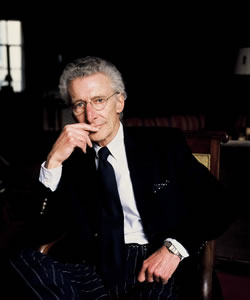De Engelse schrijver Nick Stone werd geboren op 31 oktober 1966 in Cambridge. Zie ook mijn blog van 31 oktober 2009.
“Nick, the radio doesn’t work.”
“That’s because you smacked it with your shoe,” I said.
“‘Cause it wasn’t loud enough!”
“Laurie, did you really think that would fix it?”
She folded her arms and stared out the window into the night. “I don’t understand, Nick. Why are we using a ’91 Geo Prism for this?”
“I told you, you have to use a nondescript vehicle for pulling a robbery. And a ’91 is about as nondescript as they get!”
Laurie turned and glared at me. “And what would you know about pulling a robbery? We’ve never done this before.”
“True, but how hard could it be? I pull out the gun, ask for money and drive away.”
“Ask for money??”
“Well yeah! I mean, with a gun in their face, will I really have to demand it? Besides, I think it’s common courtesy to be polite while screaming obscenities and waving a gun in someone’s face.”
She eyed me suspiciously. “Have you been smoking banana peels again?”
By two in the morning we were sitting in our Geo in a parking lot across the street from a Sunoco gas station in Allen Park, MI. The station was deserted but still open. We watched for several minutes, but no one came or left the station. So far, everything was perfect.
“Do you really think you can pull this off?” she asked.
I flashed her a quick smile. “No one’s as smooth as Nick Stone!”
When I was convinced there were no customers inside, I had Laurie pull the getaway Geo up to the Sunoco’s front door, parking so close no one else could get inside the building. I put on my ski mask, grabbed Laurie’s .38 snub-nose revolver and a cloth bag and went inside.
“Hi there!” was my congenial greeting to the girl behind the counter. “You know what I am,” and I pointed to the ski mask, “you know what this is,” I held up the gun, “and I assume you know what to do with this,” I said, and tossed her the bag.”

Nick Stone (Cambridge, 31 oktober 1966)
De Amerikaanse dichter, schrijver en literatuurcriticus Bruce Bawer werd geboren op 31 oktober 1956 in New York. Zie ook mijn blog van 31 oktober 2008 en ook mijn blog van 31 oktober 2009.
The View from an Airplane at Night, over California
This is a sight that Wordsworth never knew,
whether looking down from mountain, bridge, or hill:
An endless field of lights, white, orange, and blue,
as small and bright as stars, and nearly still,
but moving slowly, many miles below,
in blackness, as stars crawl across the skies,
and ranked in rows that stars will never know,
like beads strung on a thousand latticed ties.
Would even Wordsworth, seeing what I see,
know that these lights are not well-ordered stars
that have been here a near-eternity,
but houses, streetlights, factories, and cars?
Or has this slim craft made too high a leap
above it all, and is the dark too deep?
Saxophone
Walking down Seventh Avenue in the snow
I turn down Forty-eighth Street and see
a dozen guitars hanging in a window.
Lord, it’s the place where I bought my saxophone.
Suddenly I remember: twelve years old,
my voice about to change, the instrument
heavy in my hands, bright gold, ice cold.
I blew my lungs out, but it only brayed.
The salesman reached out, took it away from me,
wiped the mouthpiece on his sleeve, and rent
the warm air with a perfect bell-like tone.
My father and I smiled, and the salesman played
an old, familiar Hoagy Carmichael song,
and the stockboy put down a box and sang along

Bruce Bawer (New York, 31 oktober 1956)
De Canadese schrijver Joseph Boyden werd geboren op 31 oktober 1966 in Willowdale, Ontario. Zie ook mijn blog van 31 oktober 2008 en ook mijn blog van 31 oktober 2009.
Uit: Three Day Road
“It whistles like a giant eagle screaming, so close now that I must cover my ears.
I have paddled by myself against the big river’s current for many days to get here. No mind. My one living relation died in a faraway place, and I am here to greet his friend Elijah. Elijah Whiskeyjack is as close to a relation as I still have, and I will paddle him home.
Joseph Netmaker brought the letter out to me. Winter had just started to settle itself into the country. Joseph walked on snowshoes from the town. “This is for you, Niska,” he said. “It is from the Canadian boss, their hookimaw.”
As soon as I saw the brown letter, the English words written upon it, I knew what it contained. I sat down beside the fire and stirred at it with a stick while Joseph read, first out loud and in his stumbling English, then for me in our language.
“‘Serial No. 6711. Deeply regret to inform you, Private First Class Xavier Bird, infantry, officially reported died of wounds in the field, November 3, 1918. Director of Records.’ “
I waited for more, but that was all. When Joseph left, I was alone.
Many moons later, when the winter ice was leaving and travel was difficult, Joseph came back with another letter. He explained that it was in reference to Elijah, and that Old Man Ferguson had given it to him to give to me since I was the closest thing to a relation that Elijah had.
The letter said that Elijah had been wounded, that he had only one leg now, that he had tried to rescue another soldier, was given a medal for bravery. It said that although weak, he had healed enough to travel and was expected to arrive in the same town from which he and Xavier had left so long ago.
I had Joseph explain to me how the wemistikoshiw calendar worked, what month I was to be there, and I made careful preparations to journey by canoe to that town where Elijah would arrive. I left early in the summer and paddled up the river. It was difficult. I am older now, but I travelled light. Joseph had asked to come along, but I told him no.“
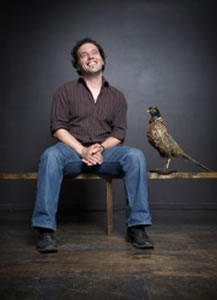
Joseph Boyden (Willowdale, 31 oktober 1966)
De Engelse dichter John Keats werd geboren op 31 oktober 1795 in Finsbury Pavement in London. Zie ook mijn blog van 31 oktober 2006 en ook mijn blog van 31 oktober 2007 en ook mijn blog van 31 oktober 2008 en ook mijn blog van 31 oktober 2009.
Bright Star
Bright star, would I were stedfast as thou art–
Not in lone splendour hung aloft the night
And watching, with eternal lids apart,
Like nature’s patient, sleepless Eremite,
The moving waters at their priestlike task
Of pure ablution round earth’s human shores,
Or gazing on the new soft-fallen mask
Of snow upon the mountains and the moors–
No–yet still stedfast, still unchangeable,
Pillow’d upon my fair love’s ripening breast,
To feel for ever its soft fall and swell,
Awake for ever in a sweet unrest,
Still, still to hear her tender-taken breath,
And so live ever–or else swoon to death.
In Drear-Nighted December
In drear-nighted December,
Too happy, happy tree,
Thy branches ne’er remember
Their green felicity:
The north cannot undo them
With a sleety whistle through them;
Nor frozen thawings glue them
From budding at the prime.
In drear-nighted December,
Too happy, happy brook,
Thy bubblings ne’er remember
Apollo’s summer look;
But with a sweet forgetting,
They stay their crystal fretting,
Never, never petting
About the frozen time.
Ah! would ’twere so with many
A gentle girl and boy!
But were there ever any
Writhed not at passed joy?
The feel of not to feel it,
When there is none to heal it
Nor numbed sense to steel it,
Was never said in rhyme.
On Death
1.
Can death be sleep, when life is but a dream,
And scenes of bliss pass as a phantom by?
The transient pleasures as a vision seem,
And yet we think the greatest pain’s to die.
2.
How strange it is that man on earth should roam,
And lead a life of woe, but not forsake
His rugged path; nor dare he view alone
His future doom which is but to awake.

John Keats (31 oktober 1795 – 23 februari 1821)
Portret van John Keats in Rome, kort voor zijn dood in 1821, door zijn vriend Joseph Severn
De Braziliaanse dichter Carlos Drummond de Andrade werd geboren op 31 oktober 1902 in Itabira, een klein dorpje in de staat Minas Gerais. Zie ook mijn blog van 31 oktober 2008 en ook mijn blog van 31 oktober 2009.
Wat de Peixoto-buurt
niet van ons weet
en heeft vergeten!
Anita Garibaldi-straat
en Siquera Campos-straat
(Francisco Braga,
Décio Vilares
op de loer, doen ze
of ze niets zien?)
Het trottoir in de schemer
heen en weer heen en
weer weer,
zijweg naar de tunnel
op zoek naar het maagdenvlies?
Weer terug:
een bankje op het plein. Bamboes.
Bamboebosje in een bries van au-au.
De bard en het meisje waren verliefd
in de Afhankelijkheidsstrijd.
Ironie van de liefde
of alleen ironie?
Straat van de 5de juli (grens
met het rijk der duisternis),
onder het oog van
nietsvermoedende huizen
gooiden we in de tuinen
en in de brievenbussen
niet goed te praten boekwerkjes
met andermans opdrachten,
brokstukken.
Laat hij de hond los? Bewaar me.
Vijfhonderd bloedhonden breken los.
Ze huilen het stramien
van bandeloze liefde.
Zie je wel? Het is in mij,
in de bard dat ze blaffen.
Dommigheid van een dom ding.
Het is al over negenduizend uur,
hoogste tijd terug te keren
naar het heiligdom van de maagd.
Nog heel eventjes. Nee.
Ik, de wijze koning, ik beveel.
Ze lacht. Lachen om mij. We blijven.
Vingers in elkaar,
verlangens parallel
in het pueriele park.
Edmundo-plein, hallo,
Bittencourt met bulderende bas.
Als hij ons zou zien zitten zoenen,
kwijlend, niet voor de eerste keer,
schrijft hij dan ingezonden brieven?
Kind als een kip zonder kop,
lachend om alles en niets,
wie de kleinste woordjes weet,
weet je waar we naar toe gaan?
Naar bed.
Niets daarvan. Slechts brandende
probeersels. Ik zwijg.
Reis over de borsten. Omlaag.
Achterlangs.
Als ik verder ga,
wie houdt me vast?
als ik het hierbij laat,
wie brengt me tot rust?
Twintig jaar later kom ik
weer door de Peixoto-buurt,
getuige van onze rendez-vous,
die vandaag niets meer weet,
van dit onhandig gedoe.
Vertaald door August Willemsen
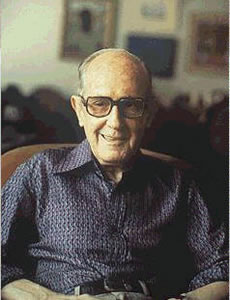
Carlos Drummond de Andrade (31 oktober 1902 – 17 augustus 1987)
De Russische schrijfster Irina Denezhkina werd geboren op 31 oktober 1981 in Yekaterinburg. Zie ook mijn blog van 31 oktober 2008 en ook mijn blog van 31 oktober 2009.
Uit: Give Me: Songs for Lovers
„Volkova had them figured out right away: nice boys, not bad-looking boys, like a set of matching dolls, but they were “nothing but a bunch of teenagers.” Volkova plays her own field: rich men. Lyapa & Co. were left to me. But all they were for me was “nothing but” too. I don’t know why. Some “husband” I have!
“Shall I see you home?”
I decided to strike a pose and declared:
“I can get there on my own. I’m not a child!”
Lyapa and I live at opposite ends of town. I only have to go around the corner from Lyapa’s place to the metro, but then I have to ride for almost an hour all the way over to
the Vyborg District. “Okay, but when you get there give me a call.”
I didn’t answer and slammed the door. Some husband…Hah! Just a messy situation.
Some young guy smashed out of his skull trailed after me from the bus stop — really tall, long hair and black glasses, clutching a bottle of Petrovskoe beer. I kept walking and kept my mouth shut, cursing Lyapa and cursing myself for wanting God knows what. Who’s he to me anyway?
Meanwhile this lowlife has started grabbing at my arm and hassling me, raising his voice. I got frightened. He was drunk, after all.
“Wassya name, sweetart? Why don’choo tell me? G’won, tell me! I’m Vova!”
A crowd of teenage kids appeared, coming toward us. Great, I thought. That’s all I need. Then I’ll send Lyapa to hell for sure, with a big bunch of roses.
The crowd came closer. Out in front of them this dirty little kid of about twelve was dancing around. He was the one who said it.
“It’s him, guys!”
They separated Vova from me with a neat smack to his mouth. The bottle of beer swung loose out of Vova’s hands and went flying into the air. I stood there and watched, stupefied, as several guys jumped up and down on Vova’s head while the others put the boot into his gut.“
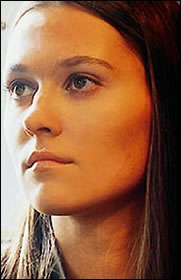
Irina Denezhkina (Yekaterinburg, 31 oktober 1981)
De Duitse schrijver Ernst Augustin werd geboren op 31 oktober 1927 in Hirschberg. Zie ook mijn blog van 31 oktober 2008 en ook mijn blog van 31 oktober 2009.
„Sicherlich nicht, man trägt hier ausnehmend schöne Badekleidung, hoch in den Weichen ausgeschnitten und freigegeben, aber auch wiederum nicht so sehr, elegant freizügig eben. Sicherlich, man hat von den Nackten in der Straßenbahnlinie 8 gehört, die sich im Wildwasser abwärts stürzen, welches – eine Eigenheit Münchens – unterirdisch unter der gesamten Stadt hindurchführt, erst im Englischen Garten durch ein Maul ins Freie tritt, wo es dann unter den Augen der japanischen Touristen unsere Nackten donnernd davonträgt. Aber das sind alles wilde Studenten, die so etwas unternehmen, und daß sie am Ende nackt und bloß in die Straßenbahn steigen, um wieder zum Maul hinaufzufahren, soll jetzt auch verboten sein. Ich weiß es nicht. Im Jakobi-Bad scheint es weitaus ziviler zuzugehen. Nahm ich an.
Das Schild an der Bretterwand irritierte mich allerdings. Wie sollte man dort hindurchgehen? Mit Badehose? Was ja verboten war. Oder sollte man sie vorher ablegen und nackt passieren, was offenkundig niemand tat. Männer mit riesigen Badehosen, entweder hoch über dem Bauch getragen, so daß gerade die Brustsäcke, oder wie man sie nennen sollte, herausschauten, oder aber unterhalb des Bauchs, was auch nicht besser aussah, gingen frei als XXXL hindurch. Und die Damen? Flatterten üppig im Wind, da war auch keine, die sich entledigte, ich habe das drei Stunden lang verfolgt.
Am Ende stand ich auf, um die Inschrift zu studieren. Sie war dauerhaft in Blech geprägt, schwarz und weiß: „Freikörpergelände“, und darunter „Zugang nur ohne Kleidung gestattet.“ Fast wäre ich mit einer Gruppe junger Männer hineingegangen (im Schwung mit hinein), fast! Sie waren alle voll bekleidet, Hemden, Hosen, Jacken, als ob sie dort eigentlich nichts zu suchen hätten, waren auch sehr laut. – Denkwürdig insofern, als ich das erste Mal war, daß ich dort eintreten wollte.
Und dann doch nicht.“
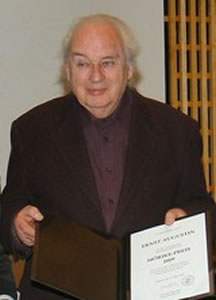
Ernst Augustin (Hirschberg, 31 oktober 1927)
De Oostenrijkse schrijver Jean Améry werd geboren op 31 oktober 1912 in Wenen. Zie ook mijn blog van 31 oktober 2006 en ook mijn blog van 31 oktober 2007 en ook mijn blog van 31 oktober 2008 en ook mijn blog van 31 oktober 2009.
Uit: Charles Bovary médecin de campagne
„Je veux qu’on l’enterre dans sa robe de noces, avec des souliers blancs, une couronne. On lui étalera ses cheveux sur les épaules ; trois cercueils : un de chêne, un d’acajou, un de plomb. Qu’on ne me dise rien, j’aurai la force. On lui mettra par-dessus toute une grande pièce de velours vert. Je le veux. Faites-le.
C’est ce que j’avais écrit, et c’est ce que l’on fit, avant que…
Puis il me sembla que la bière ne cessait de descendre et de s’enfoncer dans la terre. Et que j’aurais dû m’engloutir dans la fosse avec elle. Après tout n’était-ce pas là ma place ? Les gens m’entouraient, ils étaient bons. M. Homais me consolait, quel brave homme et quel ami fidèle ! Il fit la veillée du cadavre avec l’Abbé Bournisien, et l’un et l’autre finirent même par s’entendre, contrairement à l’habitude. Le curé me pardonna les blasphèmes que j’avais proférés dans ma douleur : Je l’exècre, votre Dieu ! m’étais-je écrié. Un brave homme. Il n’y avait que des braves gens autour de moi, Mme Tuvache, Mme Lefrançois ; même Lheureux, le boutiquier et usurier qui m’avait dépossédé de tous mes biens, était venu me présenter ses condoléances. Je ne lui garde aucune rancune, n’était-il pas normal qu’il réclamât son argent ? C’était la faute de la fatalité.
– Berthe ? Viens, mon enfant, pleure toutes les larmes de ton corps. Maman ne reviendra plus, viens pleurer avec moi, cela nous fera du bien à tous les deux. Tes bas sont déchirés, ma pauvre petite fille, et la poupée que tu tiens est déchirée, elle aussi, et maman ne rentrera plus à la maison. Aucun de ces braves gens n’a pu la sauver. Quelle tristesse. Laisse couler tes larmes, mais ne dis rien. Je sais, tu avais peur, car elle criait horriblement, ta mère, elle était blême et son visage était couvert d’une sueur glacée. Ses doigts étaient crispés et son corps s’était couvert de taches brunes. Calme-toi, mon enfant, tout est fini maintenant, va dans le jardin qui est laissé à l’abandon, car il n’y avait plus d’argent pour l’entretenir. Mais qu’aucun de ces braves gens n’ait pu faire quelque chose, c’est ce que je ne parviens pas encore à comprendre. Le docteur Canivet, ce savant, n’a trouvé aucun remède. Le docteur Larivière, mon professeur, cette lumière de la science, comme dit Homais, fut aussi impuissant que moi, moi qui en médecine brille encore moins que la plus infime des flammèches.“

Jean Améry (31 oktober 1912– 17 oktober 1978)

